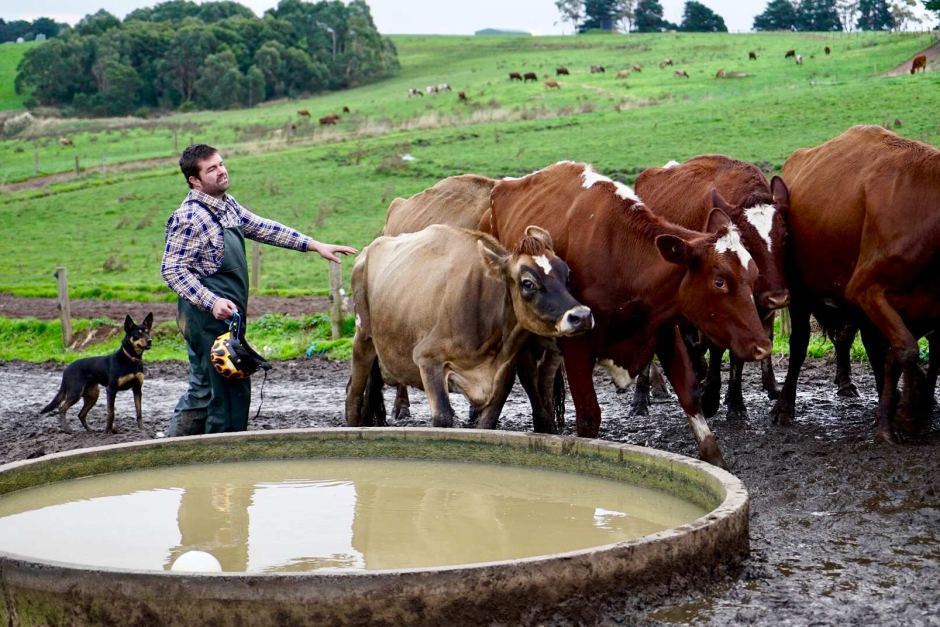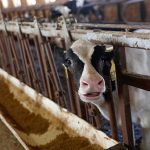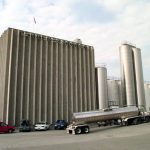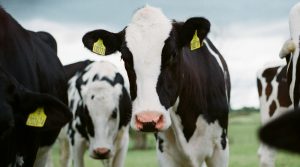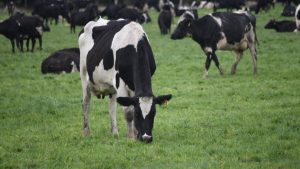
Key points:
In 1980 there were 22,000 dairy farms in Australia and today there are fewer than 6,000
Australia’s share in the global dairy market fell from 16 per cent in the 1990s to just 6 per cent last year
Australia’s milk production is forecast to fall up to 9 per cent this year
But nothing prepared him for just how tough it was to stay afloat in the embattled dairy industry.
“4:00am rolls around very quickly when you finish at 10:00pm, and you think to yourself, ‘I don’t want to get up because I know I am just going to lose more money today,'” Mr Smith told 7.30.
The former Young Farmer of the Year from Victoria’s south-west used to encourage kids to consider a career in dairy, but he does not do that any more.
“Sure there’s good times … but the tough times are bloody tough,” he said.
“And it’s very hard to tell a 14-year-old kid, look them in the eye and say, ‘Don’t have your office job, come and deal with this rubbish’.”
The combination of skyrocketing feed and water costs, inconsistent milk prices and dry conditions have put pressure on farmers right around the country.
Even those who enjoy good rainfall and green pastures — like Mr Smith — feel the pressure of the drought elsewhere because it pushes up feed costs everywhere.
He has already had to cull cows this season and says if things do not improve, he will have to cut his herd even further.
“Sometimes when a bill must be paid, you have to close your eyes and put some animals on the truck that you didn’t want to put on the truck,” he told 7.30.
“We have an attachment to these animals, we bring them up for generations and every cull decision is a hard one.
“It’s heartbreaking. It really is.”
Loss of milk leads to loss of jobs
In 1980 there were 22,000 dairy farms in Australia. Now there are fewer than 6,000.
Australia’s share in the global dairy trade has fallen from 16 per cent in the 1990s to just 6 per cent last year, and the country’s milk production is forecast to fall up to 9 per cent this year.
That drop in milk production has been blamed for the closure of dairy giant Fonterra’s factory at Dennington in south-west Victoria.
Damien Noonan is one of a hundred workers who will lose their jobs as a result in November.
“My grandfather worked there back in the 40s, then my dad worked there and my mum worked there for a few months,” he told 7.30.
“Then my brother back in the 80s and the other brother in the 90s, and me not long after, and it’s just been handed on basically through generations.
“And it just had been our tradition and it’s the end of an era. That’s pretty sad.”
At 52, Mr Noonan worries about his future job prospects and the impact of the closure on the town.
“It’s just turning a town into a ghost town now because it’s sort of the lifeblood,” he said.
“It’s basically taking away one of the major focuses of the town, so I don’t know what [the future] will hold. It’s all a bit worrying really.”
In a statement, Fonterra told 7.30 the Dennington factory was ageing, underutilised and did not meet customer needs.
“The unfortunate reality is, the site is not viable in a low milk pool environment, and we need to remove excess capacity,” the statement said.
The company said it had considered all options for the site, including sale.
“However, with no genuine interest in the site as a whole, the most responsible option is to close.”
Dairy Plan set up to tackle industry’s challenges
Former Victorian premier John Brumby has been tasked with coming up with a plan for Australian dairy.
The Dairy Plan is holding workshops with farmers around the country to work out a way forward and attempt to speak with a united voice to Government.
Mr Brumby said Australians needed to talk about dairy.
“There really is no regional industry that has such an impact in Australia as dairy,” he told 7.30.
“It’s 40,000 direct jobs, it’s 100,000 indirect jobs. Without dairy, we won’t have prosperous regional economies.”
He said complex answers were needed for the complex problems facing the industry.
“There’s no silver bullet, there’s no magic bullet that’s suddenly going to fix this industry.
“It’s going to take a carefully put together plan to take the industry forward. But, you know, the alternative for our regional economies and for Australia is not worth contemplating.”
But Mr Brumby’s appointment has not been welcomed by everyone.
Lyndy Morris, a dairy farmer who also works for farm charity Aussie Helpers, told 7.30 that many farmers had little faith in Mr Brumby.
“I don’t think he’s the right man for the job. I hope he surprises me,” she said.
Ms Morris said many farmers were also apprehensive about the Dairy Plan because it is partly funded by Dairy Australia.
The research and marketing body has been in hot water recently over paying $300,000 in bonuses to its outgoing managing director and installing a $10,000 coffee machine at its inner Melbourne headquarters, while farmers face unprecedented financial pressures.
“I think we’ve been let down by our peak bodies,” Ms Morris said.
“Every month you have to pay [Dairy Australia] a levy, you have no choice, and if they’d gone out and visited 50 per cent of the farms that pay their bills I think they would have had a very different picture about what was going on on the ground.”
In a statement to 7.30, Dairy Australia refuted that claim.
“We have been very active in the past year and responded with significant new services for farmers,” the statement said.
“This includes lifting the profile of our reporting of feed prices and on farm support provided through our Regional Development Programs.”
The research and marketing body also pointed to some positive signs for dairy in its most recent Situation and Outlook report, including a 3.2 per cent increase in global dairy demand and strong domestic dairy consumption.
A spokesman for Dairy Australia also said the expensive coffee machine was suggested by staff to better stimulate collaboration across the organisation.
‘Never seen an exodus like it’
Mr Smith has an open mind about the Dairy Plan because he believes something has to change to save the industry in Australia.
“We need a fair price for our product ongoing, we need Government to help further our export potential into Asia and other countries,” he said.
“We also just need the general society to value our product and pay a fair price for the hard work that we do.”
He said if nothing changed, there would not be a dairy industry left in a few years.
“If you look at the figures of the families lost to our industry in the last 18 months and the coming 12 months, you would have never seen an exodus of dairy farmers like it ever,” he said.
“If something isn’t done now, you won’t be drinking Australian milk, you just won’t be.”
